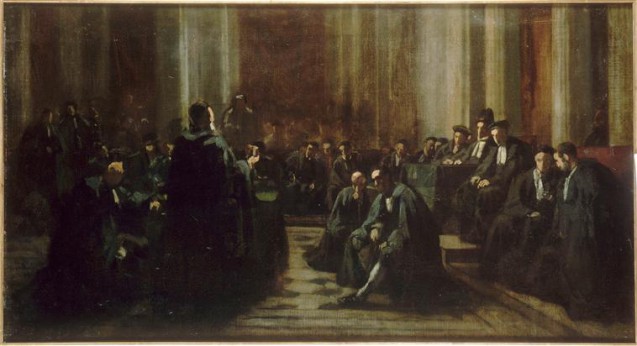Monsieur de Champagny, since, by our decree dated 30 May ult., we ordered the most notable Jews to come to an assembly, in our good town of Paris, we have appointed, by a decree today, Messrs Molé, Portalis and Pasquier, maîtres des requêtes in our Conseil d’État, as our commissioners to the said assembly.
We desire that the members of this assembly should meet on 26 of this month, and subsequently as and when they will, and that they appoint a president, two secretaries and three clerks from amongst themselves. When the assembly is organised, our commissioners will submit for discussion the questions here enclosed with this letter. The assembly will appoint a commission to prepare the work and to direct the discussion on each of these questions. Since the Jews in our kingdom of Italy have asked the favour of being admitted to this assembly, we have granted them their wish, and we desire that they be allowed to come to Paris.
Our aim is to reconcile the belief of the Jews with the duties of the French, and to make them useful citizens, since we are resolved to remedy the ill in which many of them participate to the detriment of our subjects.
Napoléon
ENCLOSURE – QUESTIONS TO BE ASKED OF THE ASSEMBLY OF JEWS
1 Is it lawful for Jews to marry more than one wife?
2 Is divorce permitted by the Jewish religion?
3 Can a Jewess marry a Christian, or a Christian woman a Jew? Or does the law only allow Jews to marry amongst themselves?
4 Do Jews regard Frenchmen as brethren or strangers?
5 In any case, what duties does their law prescribe to Jews towards Frenchmen who are not of the Jewish religion?
6 Do Jews who were born in France, and who have the legal status of French citizens, regard France as their fatherland? Is it their duty to defend it, to obey its laws, and to accommodate themselves to all the provisions of the Civil Code?
7 Who nominates Rabbis?
8 What police jurisdiction do the Rabbis exercise over the Jews? What kind of police magistracy do they recognise among themselves?
9 Are the forms of election and jurisdiction of the police magistrates laid down by the Jewish law, or merely consecrated by custom?
10 Are there any professions prohibited by Jewish law?
11 Does the law forbid Jews to practise usury in dealing with their brethren?
12 Does it forbid or does it allow them to practice usury in dealing with strangers?

This document is part of a private collection. It is reproduced in Volume 6 of Napoleon Bonaparte’s General Correspondence published by the Fondation Napoléon and Fayard in 2009.
It is part of our CLOSE-UP on Napoleon I, the Great Sanhedrin and the integration of the Jews under the Empire.

